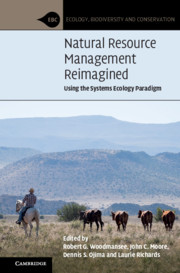Book contents
- Natural Resource Management Reimagined
- Ecology, Biodiversity and Conservation
- Natural Resource Management Reimagined
- Copyright page
- Contents
- Contributors
- Preface
- 1 The Systems Ecology Paradigm
- 2 Environmental and Natural Resource Challenges in the Twenty-First Century
- 3 Evolution of Ecosystem Science to Advance Science and Society in the Twenty-First Century
- 4 Five Decades of Modeling Supporting the Systems Ecology Paradigm
- 5 Advances in Technology Supporting the Systems Ecology Paradigm
- 6 Emergence of Cross-Scale Structural and Functional Processes in Ecosystem Science
- 7 Evolution of the Systems Ecology Paradigm in Managing Ecosystems
- 8 Land/Atmosphere/Water Interactions
- 9 Humans in Ecosystems
- 10 A Systems Ecology Approach for Community-Based Decision Making
- 11 Environmental Literacy
- 12 Organizational and Administrative Challenges and Innovations
- 13 Where to From Here? Unraveling Wicked Problems
- Index
- References
4 - Five Decades of Modeling Supporting the Systems Ecology Paradigm
Published online by Cambridge University Press: 25 February 2021
- Natural Resource Management Reimagined
- Ecology, Biodiversity and Conservation
- Natural Resource Management Reimagined
- Copyright page
- Contents
- Contributors
- Preface
- 1 The Systems Ecology Paradigm
- 2 Environmental and Natural Resource Challenges in the Twenty-First Century
- 3 Evolution of Ecosystem Science to Advance Science and Society in the Twenty-First Century
- 4 Five Decades of Modeling Supporting the Systems Ecology Paradigm
- 5 Advances in Technology Supporting the Systems Ecology Paradigm
- 6 Emergence of Cross-Scale Structural and Functional Processes in Ecosystem Science
- 7 Evolution of the Systems Ecology Paradigm in Managing Ecosystems
- 8 Land/Atmosphere/Water Interactions
- 9 Humans in Ecosystems
- 10 A Systems Ecology Approach for Community-Based Decision Making
- 11 Environmental Literacy
- 12 Organizational and Administrative Challenges and Innovations
- 13 Where to From Here? Unraveling Wicked Problems
- Index
- References
Summary
Ecosystem modeling, a pillar of the systems ecology paradigm (SEP), addresses questions such as, how much carbon and nitrogen are cycled within ecological sites, landscapes, or indeed the earth system? Or how are human activities modifying these flows? Modeling, when coupled with field and laboratory studies, represents the essence of the SEP in that they embody accumulated knowledge and generate hypotheses to test understanding of ecosystem processes and behavior. Initially, ecosystem models were primarily used to improve our understanding about how biophysical aspects of ecosystems operate. However, current ecosystem models are widely used to make accurate predictions about how large-scale phenomena such as climate change and management practices impact ecosystem dynamics and assess potential effects of these changes on economic activity and policy making. In sum, ecosystem models embedded in the SEP remain our best mechanism to integrate diverse types of knowledge regarding how the earth system functions and to make quantitative predictions that can be confronted with observations of reality. Modeling efforts discussed are the Century ecosystem model, DayCent ecosystem model, Grassland Ecosystem Model ELM, food web models, Savanna model, agent-based and coupled systems modeling, and Bayesian modeling.
Keywords
- Type
- Chapter
- Information
- Natural Resource Management ReimaginedUsing the Systems Ecology Paradigm, pp. 90 - 130Publisher: Cambridge University PressPrint publication year: 2021
References
- 2
- Cited by

